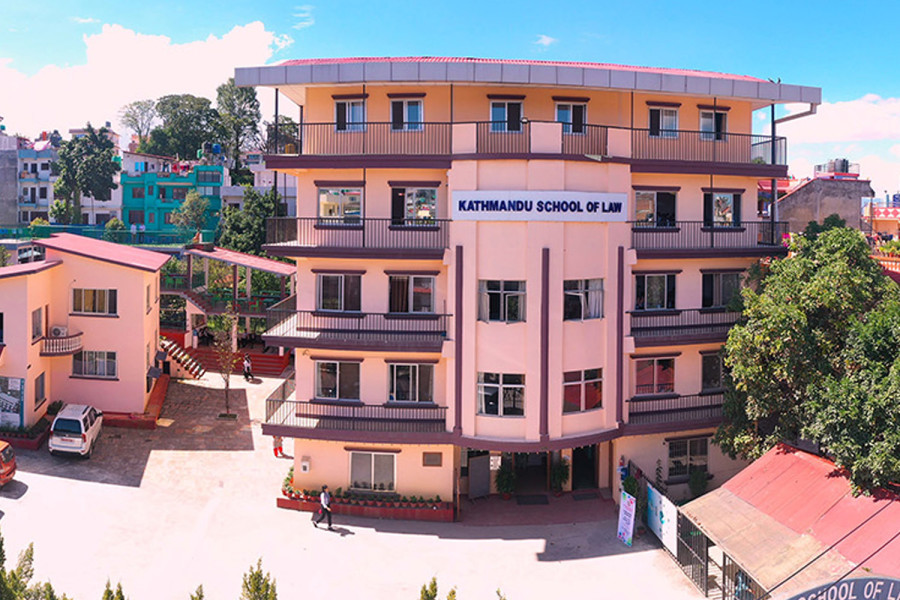National
National Women’s Commission to probe sexual misconduct charges at KSL
The body is working to build a credible case but lack of named testimonies remains an obstacle, official says.
Post Report
The National Women’s Commission is formally investigating allegations of sexual misconduct, abuse, harassment and homophobia at the Kathmandu School of Law after the KSL Accountability Group, an alumni-led working committee, submitted a formal application and evidence regarding the alleged acts.
The constitutional body is now working to build a credible case but the lack of direct, named testimonies remains a major obstacle in moving the investigation forward, Roshani Devi Karki, under secretary at the commission, told the Post.
KSL, one of Nepal’s top law colleges, has been rocked by wide-ranging allegations of harassment, abuse, and ‘toxic’ institutional culture, primarily involving its Director Yubaraj Sangroula and other faculty members.
The case first gained public attention in early March when a student at the college, Sandhya Gautam, took to Instagram to accuse KSL and its director of ignoring her complaints of sexual harassment, misogyny, and homophobia that students at the institution were allegedly facing for a long time.
Gautam’s social media post prompted hundreds of confessions and comments about the alleged abuse culture at KSL.
Over 150 alumni also signed a public statement expressing solidarity and demanding an independent investigation and justice for victims.
Amid this, the KSL Accountability Group asked the commission to form an independent investigative committee.
The group also handed over key documentation, including 72 victim testimonials collected through an online form and in-person interviews.
Karki confirmed to the Post that the commission has taken up the case and is currently reviewing the evidence submitted.
Karki added that the commission has held meetings with the group’s representatives and reviewed the solidarity letter and testimonies derived from online forms.
The commission is corresponding with the National Human Rights Commission to conduct a joint investigation due to the complex nature of the case, Karki said.
“It may seem like we’re doing nothing but we are trying our best,” she said. “Most of the testimonies we’ve received are anonymous. For those with names, we must verify their identities.”
The commission has also received testimonies from secondhand witnesses who confirmed witnessing abuse, as well as emails from former KSL students abroad describing the toxic environment at the college, Karki added.
Meanwhile, the commission has sent a letter to KSL asking for clarification regarding its handling of the case. In return, the college submitted a document detailing the formation of their own investigation committee and its actions.
However, that committee, formed on March 14, consisting of former judge and judge representative Shree Krishna Bhattarai, journalist representative Tirtha Koirala, and alumna and student representative Seema Dhami, dissolved soon after.
Concerns were raised about the impartiality of an investigation led by the same institution where the accused held the leadership position. The committee eventually withdrew from the process, citing a ‘lack of jurisdiction’.
After this, the working group again called for an independent, external investigation committee to be formed through a transparent process.
However, instead, in a subsequent notice issued on March 30, the college instructed anyone with grievances to file complaints with its Internal Complaints and Grievances Committee, within a week and with “supporting evidence.”
The notice did not list committee members or detail how victims’ identities would be protected.
“How can victims feel safe going back to the same place where the abuse happened?” a working group member said. “As an alumnus, if I went to testify, they’d recognise me at the gate, I’d have to ask security or staff where to go. My identity would be revealed before I even reached the committee.”
Despite this, on April 12, Gautam personally submitted anonymous confession documents that she had received on Instagram to the college. The college didn’t respond.
Fearing institutional inaction, the accountability group forwarded the matter to constitutional bodies like the NWC and National Human Rights Commission.
Some alumni who spoke out publicly are now facing defamation lawsuits.
These include multiple cases filed at Kathmandu District Court and Bhaktapur District Court by Sangroula, faculty members Rubin Shrestha and Gyanu Gautam against Sandhya, and alumni like Aastha Dahal and Niranjan Adhikari.
In a public statement, the KSL Accountability Group condemned the defamation suits. “We view these as deliberate attempts to silence whistleblowers and intimidate witnesses,” the group said. “These lawsuits are a direct threat to human rights defenders and freedom of speech.”
Ongoing legal harassment has only made it harder for victims to come forward.
“It’s difficult to testify when those who once spoke freely are being dragged to court,” one survivor told the Post.
But the women’s commission has reiterated its commitment to protect victims’ identities and called on survivors to come forward through direct communication channels.
Victims can reach the commission via their helpline (1145), through email at [email protected], or by submitting an online complaint.
“The involvement of primary victims is crucial for the investigation to progress,” Karki said. “We’re working with the accountability group to create a safe space so primary victims can visit the commission.”
She added, “We need primary victims and survivors to step forward beyond online forms. Only with verifiable testimonies can we take further legal steps.”




 10.12°C Kathmandu
10.12°C Kathmandu














